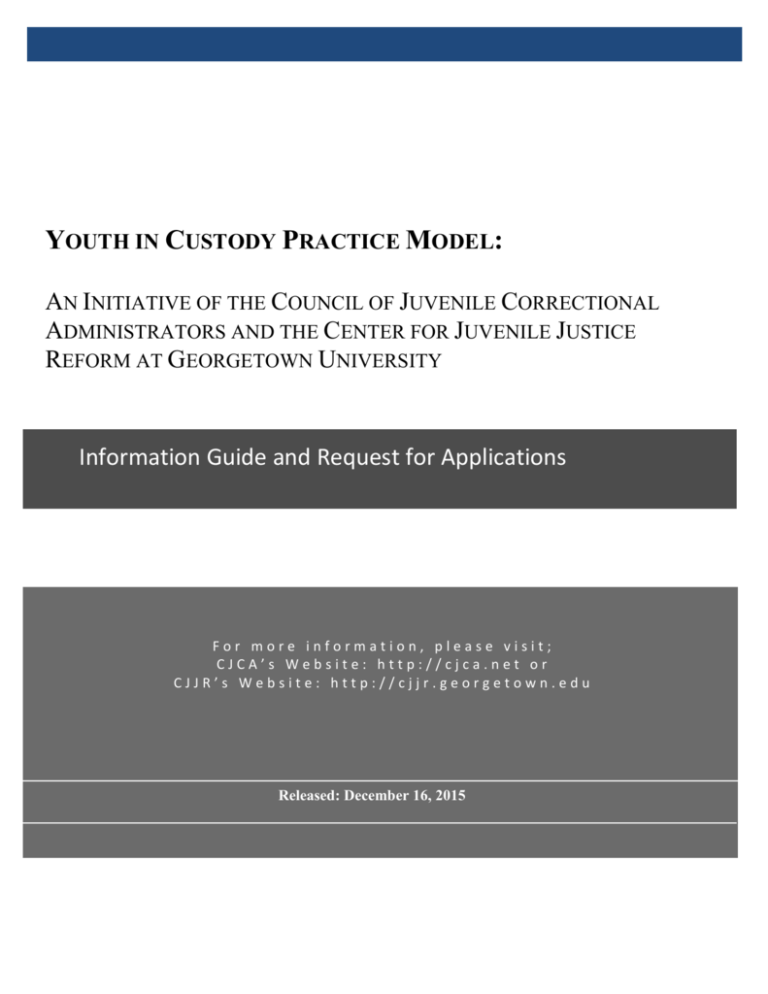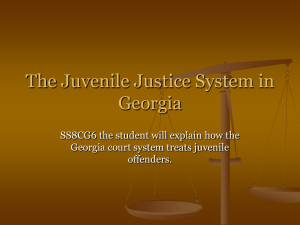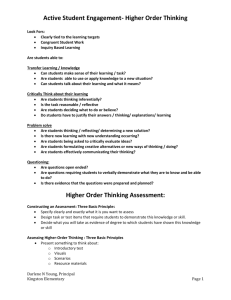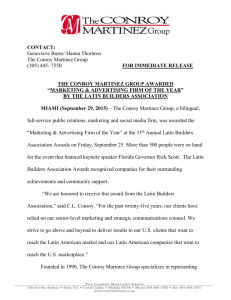Youth in Custody Practice Model RFA
advertisement

YOUTH IN CUSTODY PRACTICE MODEL: AN INITIATIVE OF THE COUNCIL OF JUVENILE CORRECTIONAL ADMINISTRATORS AND THE CENTER FOR JUVENILE JUSTICE REFORM AT GEORGETOWN UNIVERSITY Information Guide and Request for Applications For more information, please visit; CJCA’s Website: http://cjca.net or CJJR’s Website: http://cjjr.georgetown.edu Released: December 16, 2015 YOUTH IN CUSTODY PRACTICE MODEL INFORMATION GUIDE AND REQUEST FOR APPLICATIONS Table of Contents I. Background and Overview ........................................................................................3 II. Who Should Apply ....................................................................................................5 III. Training and Technical Assistance Package ..............................................................5 IV. Goals, Expected Outcomes and Evaluation ...............................................................7 V. Participant Investment and Expectations ...................................................................8 VI. Application Process and Selection Criteria................................................................9 VII. Letter of Interest Guidelines ......................................................................................10 VIII. Application Guidelines ..............................................................................................11 IX. About CJCA and CJJR...............................................................................................12 X. Key Dates ...................................................................................................................13 Letter of Interest Cover Sheet ................................................................................................15 Application Cover Sheet ........................................................................................................16 Any questions should be directed to Darlene Conroy at darlene.conroy@cjca.net 2 YOUTH IN CUSTODY PRACTICE MODEL INFORMATION GUIDE AND REQUEST FOR APPLICATIONS 3 I. Background and Overview In recent years, the administration of juvenile corrections has been complicated by numerous challenges. Staff turnover, media scrutiny, budget cuts, and intense political pressure threaten even the best efforts to align practices with rehabilitative principles and objectives. Around the country, system partners are routinely being asked to do more with less. This is especially true for staff operating long-term residential facilities for high-risk youth. As systems realign and downsize, many facility workers now report seeing higher percentages of youth residents with significant needs, including mental health, substance use and gang involvement issues. Given these concerns, juvenile correctional professionals and their partners seek assistance. They wish to work in ways that are smarter, better and more cost-effective. They want tools to guide system improvement efforts and strategies tailored to serving a youth population with increasingly complex needs. The Youth in Custody Practice Model (YICPM) initiative responds to this call for help. Informed by research on “what works” in serving youth in custody, as well as professional standards and the field’s preeminent thinking on best practices, the YICPM initiative is designed to assist state and county juvenile correctional agencies to implement a comprehensive and effective service delivery approach. Utilizing the YICPM monograph as a roadmap, the Council of Juvenile Correctional Administrators (CJCA), the Center for Juvenile Justice Reform at Georgetown University’s McCourt School of Public Policy (CJJR), and a team of consultants will provide participating agencies with 18 months of training and technical assistance (TTA) to align core, research-based principles with everyday practice, and achieve more positive outcomes for youth, families, staff and communities. The Youth in Custody Practice Model provides agencies with guidance on essential practices in four key areas: 1. Case planning; 2. Facility-based services (e.g., education, behavioral health, behavior management, rehabilitative programming); 3. Transition/reentry; and 4. Community-based services. The enumerated practices stem from the view that services and approaches for post-dispositional youth and their families should be: research-based; developmentally appropriate; familycentered; individually focused and predicated on validated assessments; strength-based; traumainformed; data-informed and outcome-driven; culturally responsive; and coordinated. Ultimately, the goals of the YICPM initiative are to (1) promote safe, fair and healthy environments for youth, staff and families; (2) prepare, equip, empower and support staff to provide effective services; (3) increase positive youth and family experiences and outcomes; and (4) enhance community safety. Anticipated outcomes from the effort are listed in the section below, titled “Goals, Expected Outcomes and Evaluation.” With support and guidance from CJCA and CJJR, the YICPM was authored by a team of national juvenile justice experts, including: Any questions should be directed to Darlene Conroy at darlene.conroy@cjca.net YOUTH IN CUSTODY PRACTICE MODEL INFORMATION GUIDE AND REQUEST FOR APPLICATIONS 4 Kelly Dedel, Ph.D., Director of One in 37 Research, Inc., and court monitor and subject matter expert in several legal cases involving the conditions of confinement in juvenile facilities across the U.S.; Monique Marrow, Ph.D., child clinical psychologist and juvenile justice consultant for the Center for Trauma Recovery and Juvenile Justice at the University of Connecticut Health Center and the Center on Trauma and Children at the University of Kentucky; Fariborz Pakseresht, Director of the Oregon Youth Authority, and Vice President of CJCA; and Michael Umpierre, Esq., CJJR Senior Research Fellow and former co-coordinator of the National Center for Youth in Custody. At the end of the 18-month training and technical assistance process, participating sites will have: developed a strategic action plan to implement the YICPM in up to three demonstration facilities; built a coalition of support for system improvements; taken measurable steps toward ensuring long-term sustainability of reform efforts (e.g., policy development, training, quality assurance, and performance measurement); and established a mechanism to measure the effectiveness of the TTA in changing practices and achieving positive outcomes. It is also expected that implementation of the action plan and formulation of plans to expand the effort throughout the jurisdiction will begin prior to the completion of the 18-month TTA period. CJCA and CJJR will select up to three sites to implement the YICPM. The following schematic portrays the application process and a more detailed description is provided later in the section titled “Application Process and Criteria.” Overview of Application Process Any interested state or county juvenile justice agency will submit a Letter of Interest indicating an intent to apply for the YICPM initiative (deadline: 1/8/16), followed by a full application (deadline: 2/8/16). Applicants are strongly encouraged but not required to participate in an informational call hosted by CJCA and CJJR (1/11/16). Finalists will be interviewed and assessed to determine readiness to implement the YICPM (2/16/16 to 2/19/16). Up to three sites will be selected to participate in the Youth in Custody Practice Model (2/22/16). The sites will receive training and technical assistance to implement the YICPM in up to three demonstration facilities (TTA commences 3/1/16). An evaluation of the project will be conducted in each site. Any questions should be directed to Darlene Conroy at darlene.conroy@cjca.net YOUTH IN CUSTODY PRACTICE MODEL INFORMATION GUIDE AND REQUEST FOR APPLICATIONS 5 II. Who Should Apply The principal value of the Youth in Custody Practice Model initiative is that it offers juvenile justice system officials and partners a comprehensive, cohesive, research-based framework for juvenile justice service delivery. It is geared towards state and county juvenile correctional agencies seeking to: Improve outcomes for youth, families, staff and communities; Drive systemic change in a unified, thoughtful manner; Provide additional support to staff; Build stronger partnerships with families, stakeholders and communities; Increase consistency in practices; Create greater systems of accountability and quality assurance; and Operate more cost-effectively. Applicants must have a commitment from the site’s key juvenile correctional agency leaders to fully support implementation of the YICPM in up to three facilities. This includes leadership working closely with CJCA, CJJR and the consulting team to establish the infrastructure needed for implementation, promote buy-in from staff, and adopt the model in its totality and with fidelity to its underlying principles. III. Training and Technical Assistance Package Intensive training and technical assistance will be provided to the sites to support their efforts to implement the YICPM. It is understood that each site selected to participate in the YICPM will have different strengths and weaknesses and may be more advanced in some areas of practice than others. For this reason, each site’s 18-months of training and technical assistance will be a customized package of services within the general framework of the overall initiative. The training and technical assistance will support sites in: Assessing current practices compared to the comprehensive, research-based blueprint presented by the YICPM; Developing a customized action plan to implement desired policy and practice improvements and achieve measurable objectives; Training staff on the research undergirding the YICPM and the strategies listed therein; Building and broadening a coalition of support for the system improvements through an implementation team and a key stakeholders group; Creating strategies designed to achieve long term sustainability of the efforts, such as policy development, training, quality assurance and performance measurement; and Measuring the effectiveness of the training and technical assistance in changing practices and achieving positive outcomes. The training and technical assistance will be delivered by national experts with experience in the youth in custody arena. The lead consultants providing training and technical assistance will include: Any questions should be directed to Darlene Conroy at darlene.conroy@cjca.net YOUTH IN CUSTODY PRACTICE MODEL INFORMATION GUIDE AND REQUEST FOR APPLICATIONS 6 Ned Loughran (Council of Juvenile Correctional Administrators); Shay Bilchik (Center for Juvenile Justice Reform); Kelly Dedel (One in 37 Research, Inc.); and Michael Umpierre (Center for Juvenile Justice Reform). This team of lead consultants will provide each participating site with a total of 84 days of consultation, including at least six site visits. A minimum of two lead consultants will attend each visit and the entire team will be present for the initial and final visits. The consultation will also include regular conference calls and email correspondence. Additionally, the consulting team will include a number of specialized subject matter experts available to assist sites in targeted areas requiring further attention. For example, a site may wish to delve deeply into enhancing facility-based family engagement practices or behavioral health treatment. To this end, specialized experts would provide consultation—either on site and/or by phone/email—to help agencies develop specific strategies to improve practices. The lead consultants will work with each site to identify areas of interest for this specialized consultation. Each selected site will be provided with a total of 15 days of TTA from the specialized subject matter experts. The training and technical assistance will be delivered in a phased approach. Initially, the consulting team will work with each site to develop the following four types of groups that will drive and support the work: 1. Core Leadership Team: Composed of key agency leaders with decision-making authority, the Core Leadership Team will work closely with the consulting team to set the direction of the YICPM work and ensure completion of necessary tasks. The team may include agency directors, deputy directors, chiefs of staff, general counsel, facility superintendents, education directors, behavioral health directors, etc. 2. Implementation Team: This group consists of individuals responsible for overseeing dayto-day implementation of the YICPM and meeting with the consulting team during site visits. In addition to Core Leadership Team members, this body may include managers and staff intricately involved in the YICPM practice areas (i.e., case planning, facilitybased services, transition/reentry, community-based services). 3. Workgroups: These short-term and topic-specific bodies develop targeted strategies in designated YICPM practice areas that require a heightened focus. 4. Guiding Coalition: Composed of broad sets of community and government partners who, at a high level, have the power to impact policy and practice, Guiding Coalitions build critical and sustainable support for the YICPM reform efforts. Site leaders will work jointly with the consulting team to identify the types of individuals best suited for each group. Additionally, each site will conduct a gap analysis to assess current practices against those set forth in the YICPM. Once the gap analysis is completed and the YICPM infrastructure has been established, the consulting team will work with the site to first develop and then begin to implement the strategic action plans. Any questions should be directed to Darlene Conroy at darlene.conroy@cjca.net YOUTH IN CUSTODY PRACTICE MODEL INFORMATION GUIDE AND REQUEST FOR APPLICATIONS 7 In addition to site-specific support, there will also be opportunities for the three selected sites to learn from each other and share experiences. The purpose of this peer-to-peer interaction is to build a network of leaders that supports one another during the YICPM implementation process by sharing strategies for overcoming roadblocks and ensuring sustainability. Finally, the training and technical assistance package includes a strong data collection component. Dr. Jennifer Woolard, Associate Professor of Psychology at Georgetown University and Co-Director the University’s Graduate Program in Developmental Science, and her staff will provide training and technical assistance to sites to support data collection, analysis, and report writing related to the YICPM research methodology. This effort is designed to measure the impact the YICPM has on changing practices and achieving positive outcomes. IV. Goals, Expected Outcomes and Evaluation The Youth in Custody Practice Model initiative is grounded in the belief that with the right services and supports, all youth can live healthy, productive and crime-free lives. CJCA and CJJR recognize that every effort must be made to support juvenile justice staff and partners because their jobs are extremely challenging. We also acknowledge that families and communities play critical roles in the process, and that protecting public safety is an essential element of the work. Given this foundation, the Youth in Custody Practice Model initiative is designed to help systems achieve four primary goals (as indicated in the “Background and Overview” section above): 1. 2. 3. 4. Promote safe, fair and healthy environments for youth, staff and families; Prepare, equip, empower and support staff to provide effective services; Increase positive youth and family experiences and outcomes; and Enhance community safety. The table below lists some of the anticipated outcomes associated with each of the YICPM’s four goals. The extent to which they will apply to a specific site depends on the areas of need identified by the gap analysis and targeted by the action plan. Goal Safe, Fair and Healthy Environments Staff Support Expected Outcomes Fewer incidents (e.g., youth violence, self-injurious behavior; restraint; seclusion); Fewer on-the-job injuries to staff; Increased youth, family and staff perceptions of physical, psychological and emotional safety; More appropriate staff responses to youth behavior, including increased recognition of positive behavior and proportionate responses to negative behavior; Fewer disparities in the treatment of youth of color; and Increased youth access to strength-based, developmentally appropriate and trauma-informed approaches. Increased staff perceptions of being equipped for their jobs and being heard by management; Any questions should be directed to Darlene Conroy at darlene.conroy@cjca.net YOUTH IN CUSTODY PRACTICE MODEL INFORMATION GUIDE AND REQUEST FOR APPLICATIONS Positive Youth and Family Experiences and Outcomes Community Safety 8 Increased program fidelity and policy compliance; Increased staff recognition efforts; Increased job satisfaction and staff morale; and Decreased turnover and absenteeism. Improved positive youth outcomes (e.g., educational and employment readiness and other youth competencies) Increased family participation and engagement in decision making and treatment; Improved youth and family perceptions of being heard by staff; and Improved youth, family and staff perceptions of one another. Improved youth connections to pro-social community partners and supports; Improved staff responses to desired and undesired youth behavior; Fewer community revocations/technical violations; and Decreased recidivism. As mentioned previously, a program evaluation will be completed to measure the effectiveness of the training and technical assistance and the sites’ action plans in changing practices and achieving positive outcomes. The evaluation will describe the training and TA activities of the YICPM and measure the implementation activities (outputs) that result from these interventions in the sites. This will require communication with the consultation team, including Dr. Woolard and her staff. Participating sites will be expected to use and potentially build upon their existing data to measure the extent to which improved outcomes are realized. V. Participant Investment and Expectations Implementing the YICPM will require a significant commitment from each of the participating sites. Our experience with other initiatives makes us keenly aware of the investment of time and effort that is required for success. At a minimum, participating agencies should be prepared to engage in monthly conference calls, participate in at least six site visits (including preparation and follow-up), communicate regularly with the consulting team, drive the data collection process, and coordinate the various implementation groups (e.g., implementation team, workgroups, guiding coalition). We ask that each site thoroughly examine its level of commitment and the ability to support staff members in undertaking this work. In this regard, there is an expectation that each site will be ready to move rapidly in implementing the YICPM upon selection. Sites will be expected to contribute $179,000 to support the training and technical assistance. This fee covers the following: 18 months of technical assistance from national experts, including the team of lead consultants and the specialized subject matter experts. The fee includes all consultant fees, consultant travel, and costs associated with conference calls and webinars; Any questions should be directed to Darlene Conroy at darlene.conroy@cjca.net YOUTH IN CUSTODY PRACTICE MODEL INFORMATION GUIDE AND REQUEST FOR APPLICATIONS 9 Evaluation of the effectiveness of the training and technical assistance and action plans in changing practices and achieving outcomes in the participating sites; and CJCA staff support for coordinating and managing all aspects of the project. This fee must be paid in full prior to commencement of the training and technical assistance. Please note that this fee does not include the cost of local staff time devoted to this project. It is recommended that 50% of a staff person’s time be devoted to managing and coordinating this project. CJCA, CJJR and the consultants will work with this staff person to coordinate all aspects of the project. VI. Application Process and Selection Criteria Three sites (i.e., state or county juvenile justice agencies) will be selected to participate in the program through a competitive application process. The strongest applicants will have: A history of juvenile justice reforms; High-level commitment to quality system and practice improvements at the agency and facility levels, including through the use of policy development, training, quality assurance and performance measurement; The capacity to collect data over a sustained period of time through an existing information system in order to collaborate with the YICPM data collection and evaluation process; and A willingness to focus YICPM implementation in up to three facilities, with the goal of expanding implementation to other facilities in the jurisdiction. These criteria ensure that the selected sites are ready and able to implement the reforms proposed by the YICPM. To apply for the YICPM, sites must first submit a Letter of Interest by 11:59 pm in the applicant’s local time zone on January 8, 2016. Guidelines for the Letter of Interest and the required cover sheet are listed below. On January 11, 2016 from 12 – 1:30 pm EST, CJCA and CJJR will host an informational call about the YICPM for prospective applicants (see “Key Dates” section below for call information). While participation on the call is strongly recommended, it is not required. A summary of the questions asked and answered on the call will be posted on the CJCA and CJJR websites. Applications must be submitted by 11:59 pm in the applicant’s local time zone on February 8, 2016. The application guidelines are listed below. Please be sure to follow the instructions provided as applications will be assessed on the basis of the four criteria listed above, as well as the clarity and completeness of responses to the application questions. Finalists will be selected and notified by February 12, 2016. Between February 16-19, 2016, CJCA and CJJR will host interviews with each finalist to further determine readiness to Any questions should be directed to Darlene Conroy at darlene.conroy@cjca.net YOUTH IN CUSTODY PRACTICE MODEL INFORMATION GUIDE AND REQUEST FOR APPLICATIONS 10 implement the YICPM. CJCA and CJJR will work with each applicant to identify a time for the one-hour interview. The interview must include the juvenile justice agency director, but also may include other key leaders, such as chiefs of staff and facility superintendents. Selected participants will be notified on February 22, 2016. At that time, participants will receive further information in order to commence the training and technical assistance services on March 1, 2016. VII. Letter of Interest Guidelines We recommend that each potential applicant convene an appropriate group of leaders and key stakeholders to review the information contained in this document and determine their interest in implementing the YICPM. If interested in engaging in this work, you are required to first submit a two- to three-page letter of interest. This letter should address the following: 1. Your objectives in participating in the Youth in Custody Practice Model. 2. The facilities in which you plan to demonstrate the YICPM (up to three), including each facility’s relationship to the agency (e.g., operated by the agency or private organization), location, bed capacity, current number of residents, number of staff, general aggregatelevel background information on residents (e.g., race, gender, offense types, risk levels, special needs), and any other information about the facility you deem important to note. 3. The individuals whom you expect to lead the effort as part of the YICPM Core Leadership Team (described above) and their level of commitment to system/facility reforms and enhancement. Note that it is not necessary to provide a final, definitive list Core Leadership Team members at this stage of the application process. Rather, this area of inquiry seeks to gauge the types of leaders who will guide the work (e.g., agency directors, deputy directors, chiefs of staff, general counsel, facility superintendents, education directors, behavioral health directors) and their willingness to engage in the YICPM. 4. Your understanding of the participant investment and expectations (see above), and if already identified, how you plan to fund your participation in the program. All Letters of Interest should use the following format: Microsoft Word or PDF format 12-point font Single spaced Include page numbers Maximum of three pages (not including the cover page) Letters of Interest are due by 11:59 pm in the applicant’s local time zone on January 8, 2016 and should be emailed to Darlene Conroy at darlene.conroy@cjca.net. All Letters of Interest must include the cover letter below (which must be signed by the agency’s director). If unable to scan Any questions should be directed to Darlene Conroy at darlene.conroy@cjca.net YOUTH IN CUSTODY PRACTICE MODEL INFORMATION GUIDE AND REQUEST FOR APPLICATIONS 11 the Letter of Interest cover sheet and send electronically, you may fax the cover sheet to 781843-1688. VIII. Application Guidelines After submitting the Letter of Interest, applicants must submit responses to the application questions listed below. You may supplement responses with relevant attachments, though this is not required. Application Questions: 1. Briefly describe the juvenile correctional agency applying for the YICPM initiative (e.g., state, county) and why your agency is interested in participating in the effort. Explain why your agency considers this work to be important and what you hope to achieve. 2. Identify any relevant system improvement efforts currently being implemented by your agency and how the YICPM initiative would align with those efforts. Describe strengths and challenges faced by your agency in leading reform initiatives (e.g., workforce readiness to engage in the work; policy development mechanisms; training capacity; quality assurance structures; communications infrastructure and supports). 3. Confirm that the facilities previously identified in the Letter of Interest (up to three) will serve as the demonstration facilities for YICPM implementation. If alternative facilities have been identified, please describe each facility’s relationship to the agency (e.g., operated by the agency or private organization), location, bed capacity, current number of residents, current number of staff, general aggregate-level background information on residents (e.g., race, gender, offense types, risk levels, special needs), and any other information about the facility you deem important to note. 4. Each of the groups listed below is essential to implementing the YICPM. Indicate which of these groups (and/or any others) you intend to engage in the initiative. Agency Director Chief of Staff Clinical Staff (e.g., Qualified Mental Health Professionals, Counselors) Custody Staff (e.g., Supervisors, Unit Managers) Data / Research Staff Deputy Director (e.g., Residential Programs/Services) Education Staff Facility Superintendent(s) Quality Assurance Staff Reentry / Aftercare Staff 5. Indicate who has been identified to manage or coordinate the YICPM’s implementation, his/her title, and how much of his/her time will be devoted to the initiative. Any questions should be directed to Darlene Conroy at darlene.conroy@cjca.net YOUTH IN CUSTODY PRACTICE MODEL INFORMATION GUIDE AND REQUEST FOR APPLICATIONS 12 6. Describe your agency’s ability and willingness to collect and analyze data on practices and outcomes related to youth in custody. Identify any existing information systems, related data collection efforts (e.g., Performance-based Standards), and support staff you expect to engage in the YICPM work. 7. Identify any existing local- or state-level leadership groups, committees, task forces, etc. (external to the agency) that you expect to support the YICPM’s implementation. Briefly describe their composition, authority, organizational structure, history and leadership. 8. Provide any additional information about your agency or facilities that supports your application and that you wish to share with the selection committee. Please specifically address how you expect the selected demonstration facilities to lay the foundation for expanding the YICPM initiative throughout the jurisdiction. All applications should use the following format: Microsoft Word or PDF format 12-point font Single spaced Include page numbers Maximum of 12 pages (not including the cover page and attachments) Applications are due by 11:59 pm in the applicant’s local time zone on February 8, 2016 and should be emailed to Darlene Conroy at darlene.conroy@cjca.net. All applications must include the cover letter below (which must be signed by the agency’s director). If unable to scan the application cover sheet and send electronically, you may fax the cover sheet to 781-843-1688. IX. About CJCA and CJJR Council of Juvenile Correctional Administrators The Council of Juvenile Correctional Administrators is a national non-profit organization formed in 1994 to improve local juvenile correctional services, programs and practices and to provide national leadership and leadership development for the individuals responsible for the systems. CJCA represents the youth correctional chief executive officers in 50 states, Puerto Rico and major metropolitan counties. CJCA fulfills its mission through educational activities and programs as well as research and technical assistance projects. Education activities include: the New Directors’ Seminar for recently appointed chief executive officers; annual meetings for all directors offering sessions on best practices and evidence-based approaches; presentations at conferences hosted by other national organizations; and written materials to the public and policymakers about the issues in youth corrections. CJCA also provides information through quarterly newsletters, its website and blog. Any questions should be directed to Darlene Conroy at darlene.conroy@cjca.net YOUTH IN CUSTODY PRACTICE MODEL INFORMATION GUIDE AND REQUEST FOR APPLICATIONS 13 CJCA is a founding member of the John D. and Catherine T. MacArthur Foundation’s Models for Change Initiative and currently operates the CJCA Resource Center where it provides technical assistance and resources to the field. CJCA co-directed the National Center for Youth in Custody, an OJJDP-funded training and technical assistance center, and also developed Performance-based Standards (PbS), a program designed to provide facility leaders and staff with national standards to guide operations to best service youth, staff, families and communities and to continuously monitor daily practices and culture within facilities with performance outcome measures. Center for Juvenile Justice Reform The Center for Juvenile Justice Reform at Georgetown University advances a balanced, multisystems approach to reducing juvenile delinquency that promotes positive child and youth development, while also holding youth accountable. Housed at the McCourt School of Public Policy, CJJR is in a unique position to provide strong and sustained national leadership in identifying and highlighting the research on policies and practices that work best to reduce delinquency and achieve better outcomes for this nation's children. CJJR works to focus the nation’s juvenile justice and related systems of care on the key principles embodied in an evidence-based juvenile justice reform agenda, utilizing a multisystems approach. These include: an effective balance of prevention and intervention services; an individualized system of justice for youth; implementation of proven and effective practices; strong linkages to the community; and significant public engagement and building of public and political will. Beyond providing information on these key principles CJJR also provides guidance and instruction on how to implement this reform agenda through the adoption of sound policy and practice. In this regard, the center supports the development of stronger leaders in the juvenile justice and related systems of care and helps them to achieve better outcomes for the young people in their care. X. Key Dates January 8, 2016 Letters of Interest due by 11:59 pm in applicant’s local time zone. May be emailed to CJCA Executive Assistant, Darlene Conroy, at darlene.conroy@cjca.net or faxed to 781-843-1688. January 11, 2016 Conference call for prospective applicants from 12 pm – 1:30 pm EST (Phone: 872-240-3212; Code: 701-799-069#). A summary of the call will be posted on the CJCA and CJJR websites. February 8, 2016 Applications due by 11:59 pm in applicant’s local time zone. May be emailed to CJCA Executive Assistant, Darlene Conroy, at darlene.conroy@cjca.net or faxed to 781-843-1688. February 12, 2016 Finalists selected and notified. Any questions should be directed to Darlene Conroy at darlene.conroy@cjca.net YOUTH IN CUSTODY PRACTICE MODEL INFORMATION GUIDE AND REQUEST FOR APPLICATIONS 14 February 16-19, 2016 Interviews with finalists to further assess readiness to implement the YICPM. February 22, 2016 Selected participants notified. March 1, 2016 Training and technical assistance commences. Any questions should be directed to Darlene Conroy at darlene.conroy@cjca.net Youth in Custody Practice Model Initiative Letter of Interest Cover Sheet County or State:______________________________________________________________________ Agency Name:________________________________________________________________________ Point of Contact for Application Process Name:_______________________________________________________________________________ Title:_____________________________________Organization:________________________________ Address:_____________________________________________________________________________ Phone:_______________________________Email:___________________________________________ Juvenile Justice Agency Leader Name:_______________________________________________________________________________ Title:_____________________________________Organization:________________________________ Address:_____________________________________________________________________________ Phone:_______________________________Email:___________________________________________ By signing below, I acknowledge the submission of this Letter of Interest and indicate my agency’s intent to apply for implementation of the Youth in Custody Practice Model in up to three demonstration facilities. I also acknowledge that to be considered for selection, my agency is required to submit an application by February 8, 2016. ____________________________________________________________________________ Signature Date Any questions should be directed to Darlene Conroy at darlene.conroy@cjca.net Youth in Custody Practice Model Initiative Application Cover Sheet County or State:______________________________________________________________________ Agency Name:________________________________________________________________________ Point of Contact for Application Process Name:_______________________________________________________________________________ Title:_____________________________________Organization:________________________________ Address:_____________________________________________________________________________ Phone:_______________________________Email:___________________________________________ Juvenile Justice Agency Leader Name:_______________________________________________________________________________ Title:_____________________________________Organization:________________________________ Address:_____________________________________________________________________________ Phone:_______________________________Email:___________________________________________ By signing below, I acknowledge the submission of this application and declare my support for implementation of the Youth in Custody Practice Model in up to three demonstration facilities identified herein. ____________________________________________________________________________ Signature Date Any questions should be directed to Darlene Conroy at darlene.conroy@cjca.net




